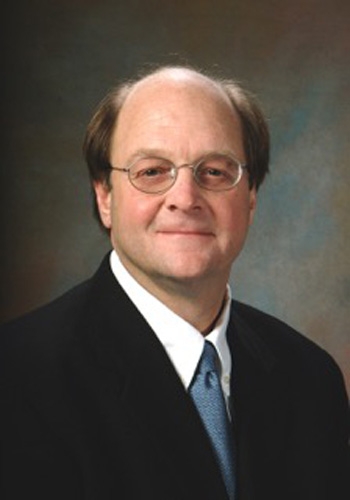Stereotactic Radiosurgery Improves Patient Outcomes

T. Rhett Spencer, MD
McLeod Radiation Oncologist
The treatment of metastatic cancer in the brain has improved considerably over the years with advancements in radiation oncology and neurosurgery. One form of treatment available at McLeod Regional Medical Center that is enhancing patient outcomes involves stereotactic radiosurgery (SRS).
Stereotactic radiosurgery, a non-surgical radiation therapy, treats cancerous tumors in the brain and spine. This form of treatment allows the McLeod Radiation Oncology team to deliver precisely-targeted radiation with sub-millimeter accuracy in a fewer number of treatments offering patients more convenience and a better quality of life.
The radiation is focused onto the area of disease to completely cover it with the dose necessary to overwhelm all of the abilities of a cancer cell to defend itself. This non-invasive, painless treatment utilizes a set of multiple beams that intersect at a single point on the tumor. The beams remain focused on the area as the linear accelerator rotates around the patient’s head.
The most common use of stereotactic radiosurgery involves the treatment of metastatic disease inside the brain. Metastatic disease occurs when the cancer cells break away from where they were first formed, travel through blood or the lymph system, and form new tumors (mets) in other parts of the body such as the brain. The met is the same type of cancer (i.e., lung or breast) but in an area away from the location of the primary disease. Mets develop in the brain, lung, spine and liver.
Advantages of SRS for patients include the ability to receive treatment close to home. Understanding that a cancer diagnosis is a life changing event for all of our patients, the decision by McLeod to invest in the technology to plan and accurately deliver this type of cancer treatment means patients do not have to leave home to receive the highest level of care. Some of these patients are also living with advanced disease. At this point in their cancer journey, patients often want to reach certain milestones. They wish to spend quality time with their family and friends. We make that possible by offering this cutting-edge cancer treatment option.
With a fewer number of treatments, SRS benefits patients by saving them time. Compared to conventional whole brain radiation therapy which involves smaller daily doses of radiation in 10 treatments, SRS delivers five to ten times the daily dose of radiation in one to five treatments. The increased dose improves the effectiveness of this form of treatment and the side effects are significantly less by treating smaller volumes.
In the past seven years, McLeod has installed three TrueBeam linear accelerators. The accuracy of these linear accelerators minimize harm to healthy tissue and bones, such as the spinal cord or lungs.
Featuring advanced imaging capabilities such as cone-beam CT, these linear accelerators also allow the team to verify the tumor’s location or make adjustments during treatment. This drastically decreases the treatment time which increases patient comfort without compromising the quality of the treatment delivered.
When performing stereotactic radiosurgery to the brain, the team ensures extreme precision and accuracy with the TrueBeam STx linear accelerator. This linear accelerator features stereoscopic X-rays and frameless technology, which means the McLeod team delivers highly accurate single fraction treatment without the conventional, invasive frame applied to the patient’s head.
Precise patient set up, tumor targeting, and continuous tracking of patient movement is accomplished through image guided radiotherapy (IGRT). Additionally, this particular linear accelerator allows the McLeod Radiation Oncology team to improve treatment times for patients. The team can treat unlimited tumors in a patient’s brain in one 30 to 45-minute treatment session rather than 30 to 45 minutes per tumor.
To further ensure the best outcomes for cancer patients in the region, McLeod Radiation Oncology holds international recognition for the highest level of safety and effectiveness in care. Following a rigorous and voluntary audit conducted by an independent third-party panel of experts in radiation oncology, McLeod is distinguished as a Cancer Center that exceeds standard measurements for delivery of quality care. One of only eight Novalis Certified Cancer Centers in the United States, McLeod is the only such cancer center in South Carolina.
In addition to this certification, McLeod Radiation Oncology has been accredited by the American College of Radiology – Radiation Oncology Practice Accreditation program (ACR ROPA) since 2013.
Radiation Oncologist Dr. T. Rhett Spencer has been treating patients at McLeod Regional Medical Center for more than 30 years. Board Certified in Radiation Oncology, he is also the Chairman of the McLeod Cancer Conference Board. Dr. Spencer received his medical degree from the Medical University of South Carolina (MUSC) in Charleston. He also completed his residency and internship at MUSC.
-
McLEOD REGIONAL MEDICAL CENTER FLORENCE
843-777-2000 -
McLEOD DARLINGTON
843-777-1100 -
McLEOD DILLON
843-774-4111 -
McLEOD LORIS
843-716-7000 -
McLEOD SEACOAST
843-390-8100 -
McLEOD CHERAW
843-537-7881 -
McLEOD CLARENDON
803-433-3000



-
McLEOD REGIONAL MEDICAL CENTER FLORENCE
843-777-2000 -
McLEOD DARLINGTON
843-777-1100 -
McLEOD DILLON
843-774-4111 -
McLEOD LORIS
843-716-7000 -
McLEOD SEACOAST
843-390-8100 -
McLEOD CHERAW
843-537-7881 -
McLEOD CLARENDON
803-433-3000
 Find a Doctor
Find a Doctor  Locations
Locations  Services
Services